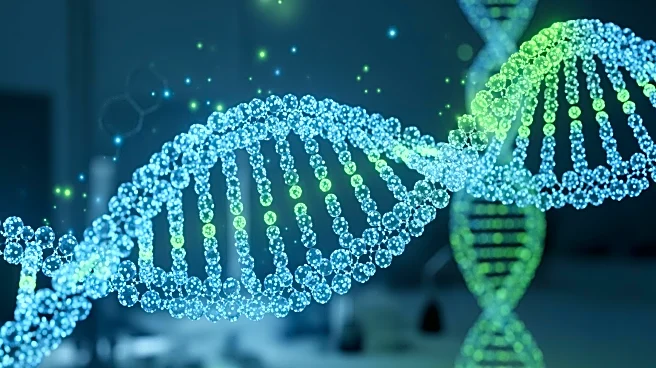What's Happening?
Recent advancements in genomic engineering have led to the development of a system using engineered recombinases for precise DNA insertion into the human genome. This method, tested on various cell lines
including HEK293FT and human embryonic stem cells, demonstrated a strong safety profile by avoiding disruptions to oncogenes, tumor suppressor genes, or essential genes. The study highlighted the use of hifiDn29-dCas9 samples, which showed no significant changes in NEBL expression across edited cell lines, confirming the non-disruptive nature of the attH1 integration. This system offers a promising option for precise genomic integration, potentially revolutionizing gene therapy and other applications requiring targeted genetic modifications.
Why It's Important?
The ability to insert DNA precisely without affecting critical genes is crucial for advancing gene therapy, particularly in treating genetic disorders and cancers. This development could lead to safer and more effective therapies by minimizing the risk of unintended genetic disruptions that could lead to cancer or other diseases. Industries involved in biotechnology and pharmaceuticals stand to benefit significantly from this technology, as it could streamline the development of gene therapies and personalized medicine. Patients with genetic disorders could see improved treatment options, while the healthcare system may experience reduced costs associated with managing side effects of less precise genetic interventions.
What's Next?
Further research and development are likely to focus on refining this technology for clinical applications. Regulatory bodies may begin evaluating the safety and efficacy of this method in clinical trials, potentially leading to its approval for therapeutic use. Stakeholders, including biotech companies and healthcare providers, may invest in this technology to develop new treatments. Ethical considerations and public acceptance will also play a role in its adoption, as discussions around genetic modifications continue to evolve.
Beyond the Headlines
This advancement raises important ethical and legal questions about genetic modification. The ability to alter human DNA with precision could lead to debates about the extent to which such technologies should be used, particularly in non-therapeutic contexts. Long-term, this could shift societal norms around genetic enhancement and the definition of 'normal' human capabilities. Legal frameworks may need to adapt to address issues of genetic privacy and consent, especially as these technologies become more accessible.









